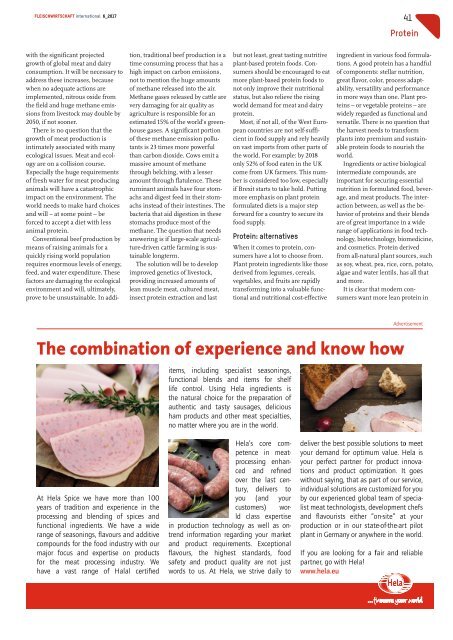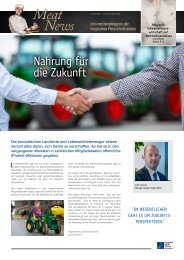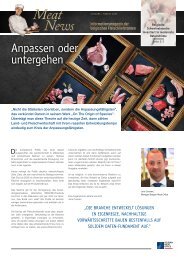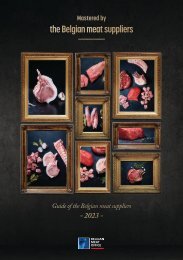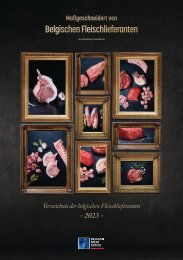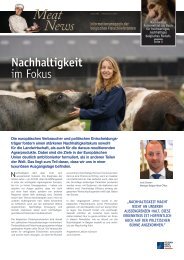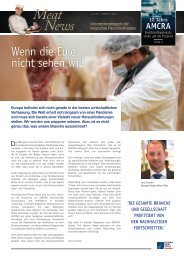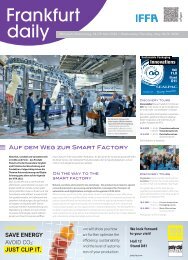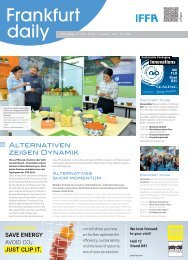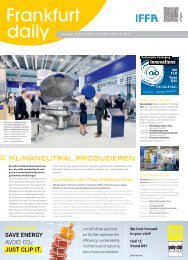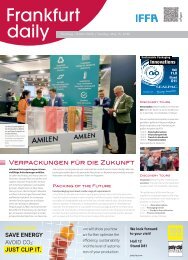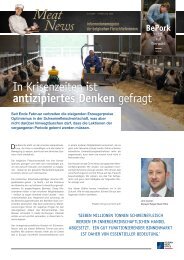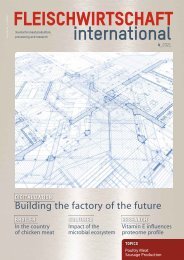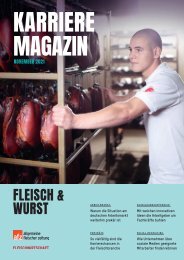FLEISCHWIRTSCHAFT international 6/2017
You also want an ePaper? Increase the reach of your titles
YUMPU automatically turns print PDFs into web optimized ePapers that Google loves.
Fleischwirtschaft <strong>international</strong> 6_<strong>2017</strong><br />
41<br />
Protein<br />
with the significant projected<br />
growth of global meat and dairy<br />
consumption. It will be necessary to<br />
address these increases, because<br />
when no adequate actions are<br />
implemented, nitrous oxide from<br />
the field and huge methane emissions<br />
from livestock may double by<br />
2050, if not sooner.<br />
There is no question that the<br />
growth of meat production is<br />
intimately associated with many<br />
ecological issues. Meat and ecology<br />
are on acollision course.<br />
Especially the huge requirements<br />
of fresh water for meat producing<br />
animals will have acatastrophic<br />
impact on the environment. The<br />
world needs to make hard choices<br />
and will –atsome point –be<br />
forced to accept adiet with less<br />
animal protein.<br />
Conventional beef production by<br />
means of raising animals for a<br />
quickly rising world population<br />
requires enormous levels of energy,<br />
feed, and water expenditure. These<br />
factors are damaging the ecological<br />
environment and will, ultimately,<br />
prove to be unsustainable. In addition,<br />
traditional beef production is a<br />
time consuming process that has a<br />
high impact on carbon emissions,<br />
not to mention the huge amounts<br />
of methane released into the air.<br />
Methane gases released by cattle are<br />
very damaging for air quality as<br />
agriculture is responsible for an<br />
estimated 15%ofthe world’s greenhouse<br />
gases. Asignificant portion<br />
of these methane emission pollutants<br />
is 23 times more powerful<br />
than carbon dioxide. Cows emit a<br />
massive amount of methane<br />
through belching, with alesser<br />
amount through flatulence. These<br />
ruminant animals have four stomachs<br />
and digest feed in their stomachs<br />
instead of their intestines. The<br />
bacteria that aid digestion in these<br />
stomachs produce most of the<br />
methane. The question that needs<br />
answering is if large-scale agriculture-driven<br />
cattle farming is sustainable<br />
longterm.<br />
The solution will be to develop<br />
improved genetics of livestock,<br />
providing increased amounts of<br />
lean muscle meat, cultured meat,<br />
insect protein extraction and last<br />
but not least, great tasting nutritive<br />
plant-based protein foods. Consumers<br />
should be encouraged to eat<br />
more plant-based protein foods to<br />
not only improve their nutritional<br />
status, but also relieve the rising<br />
world demand for meat and dairy<br />
protein.<br />
Most, if not all, of the West European<br />
countries are not self-sufficient<br />
in food supply and rely heavily<br />
on vast imports from other parts of<br />
the world. Forexample: by 2018<br />
only 52% of food eaten in the UK<br />
come from UK farmers. This number<br />
is considered too low,especially<br />
if Brexit starts to take hold. Putting<br />
more emphasis on plant protein<br />
formulated diets is amajor step<br />
forward for acountry to secure its<br />
food supply.<br />
Protein: alternatives<br />
When it comes to protein, consumers<br />
have alot to choose from.<br />
Plant protein ingredients like those<br />
derived from legumes, cereals,<br />
vegetables, and fruits are rapidly<br />
transforming into avaluable functional<br />
and nutritional cost-effective<br />
ingredient in various food formulations.<br />
Agood protein has ahandful<br />
of components: stellar nutrition,<br />
great flavor,color,process adaptability,versatility<br />
and performance<br />
in more ways than one. Plant proteins<br />
–orvegetable proteins –are<br />
widely regarded as functional and<br />
versatile. There is no question that<br />
the harvest needs to transform<br />
plants into premium and sustainable<br />
protein foods to nourish the<br />
world.<br />
Ingredients or active biological<br />
intermediate compounds, are<br />
important for securing essential<br />
nutrition in formulated food, beverage,<br />
and meat products. The interaction<br />
between, as well as the behavior<br />
of proteins and their blends<br />
are of great importance in awide<br />
range of applications in food technology,biotechnology,biomedicine,<br />
and cosmetics. Protein derived<br />
from all-natural plant sources, such<br />
as soy,wheat, pea, rice, corn, potato,<br />
algae and water lentils, has all that<br />
and more.<br />
It is clear that modern consumers<br />
want more lean protein in


